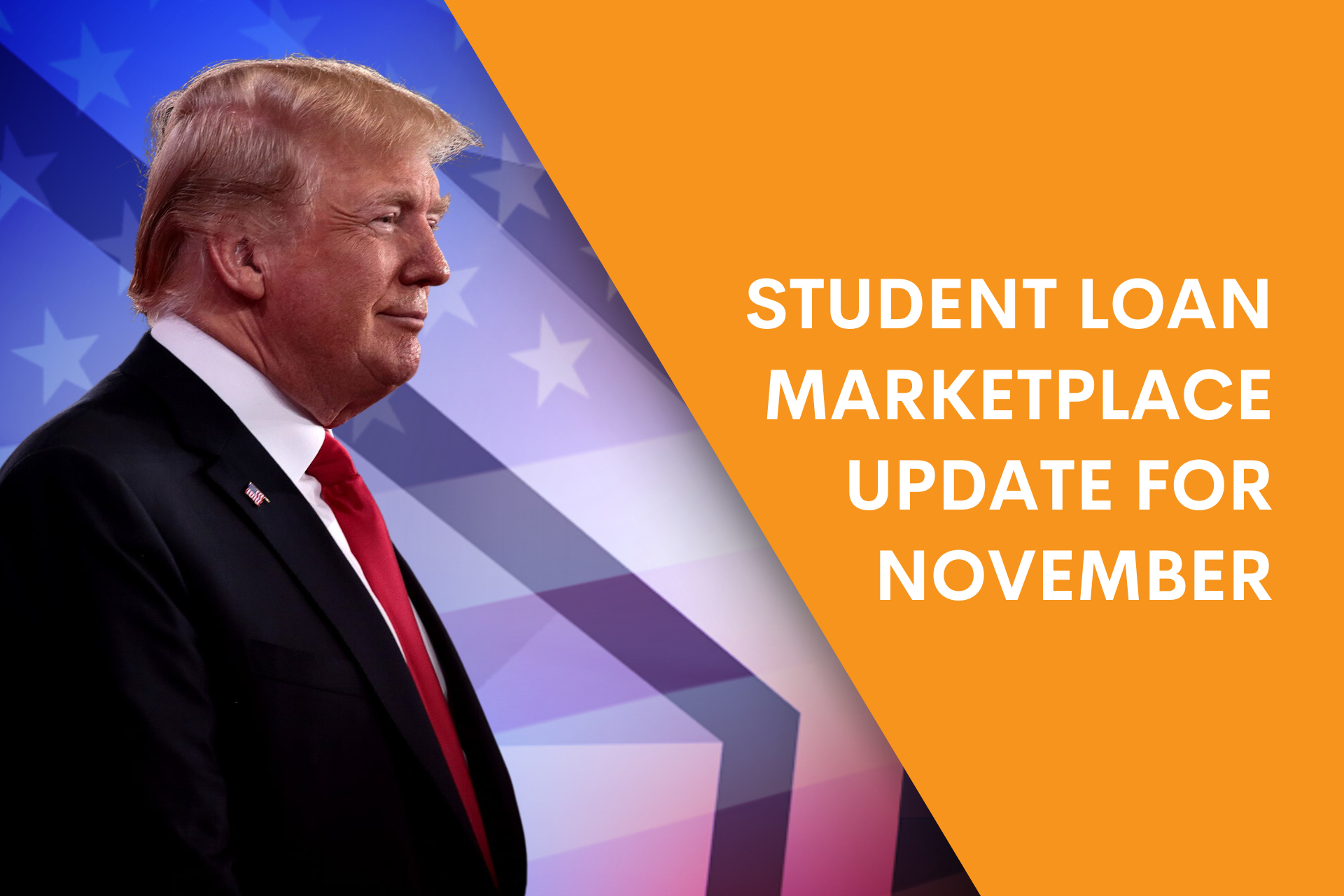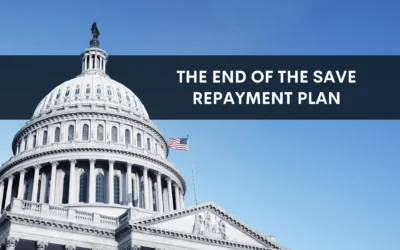Student Loan News for Nov 2024
The Trump Administration Will Bring Big Changes for Student Loan Borrowers
Last week’s election has a lot of us wondering what’s next. And for those with student loan debt, it’s particularly relevant. Most repayment options are government-driven—not only by the Executive branch but also by Congress. Even refinancing rates are impacted by economic policies and laws.
So, without any political bias, let’s unpack what a Trump White House and a Republican-controlled Congress could mean for student loan borrowers, especially for graduate health professionals already in repayment. Plus, we’ll touch on some other noteworthy updates from the past month.
Key Takeaways
- Republicans likely to end large-scale forgiveness plans, reshaping repayment options and systems.
- Courts scrutinizing SAVE and other IDR plans, threatening forgiveness-based repayment models.
- Biden’s targeted forgiveness initiatives face legal and political obstacles, limiting future changes.
- Refinancing rates drop amid Federal Reserve cuts, offering potential savings for borrowers.
Student Loan Ideologies
Like so many other topics, student loan repayment and relief has become a partisan issue.
Democrats largely supported President Biden’s moves to provide borrower relief, with initiatives like the payment and interest hiatus, mass forgiveness for lower-income borrowers, and more generous repayment options. Essentially, providing student loan relief has become a major platform issue for Democrats.
On the other side, Republicans are not in favor of blanket relief, although they recognize the system has issues. They believe enough options already exist within income-driven repayment and forgiveness plans. They aim to simplify the system but are not looking to make repayment plans more lenient or allow for widespread forgiveness.
Policy Changes are Coming
That all being said, and with Republicans in a position to steer significant policy shifts in the next few years, here’s what could be on the horizon for student loan policies:
- Rescinding Forgiveness Plans: Large-scale forgiveness initiatives like Biden’s “Plan B” are likely to be rolled back by Trump or a new Secretary of Education in early 2025.
- SAVE Plan Expected to be Phased Out: The SAVE repayment plan will most likely be canceled, with Income-Contingent Repayment (ICR), Pay As You Earn (PAYE), and Revised Pay As You Earn (REPAYE) reintroduced if courts permit. Income-Based Repayment (IBR) will likely remain as well.
- Presidential Handcuffs: Lawmakers will look to pass measures clarifying presidential (and Secretary of Education) powers over student debt, specifically around forgiving large amounts and offering repayment plans that lead to forgiveness.
- Possible Student Loan Overhaul: There’s speculation about a complete rework of loan types and repayment plans, reducing forgiveness options and possibly restructuring loan amounts. Many are pointing to The College Cost Reduction Act, introduced in January by Republicans, as the blueprint for this. I am doubtful, however. While #3 is a high priority for the new administration and many Republicans, overhauling the entire student loan system likely is not. Time will tell.
- Is PSLF Buyback at Risk? The future of the Biden administration’s PSLF Buyback initiative is unclear. While it is an initiative of the Biden administration, the buyback plan actually has a lot of common sense behind it when you consider the list of qualifying deferments and forbearances. We think it is a good and fair policy, and hope it is kept in place.
Litigation Updates
Until a Republican administration is in place, the Biden administration has some time to advance its initiatives. Unfortunately, most of these were already facing significant roadblocks in the courts:
SAVE Plan
We suspect the 8th Circuit Court will issue a final decision soon, likely cancelling the SAVE plan in its’ entirety. Should the ruling block the plan, Biden’s administration would need to decide on appealing to the Supreme Court.
With political changes on the horizon they may choose not to pursue further action. If SAVE is no more, previous repayment plans would need to be restored quickly. This could also cut short Biden’s 6-month payment pause for SAVE participants.
Legal Scrutiny on IDR Plans
Because the SAVE plan is based on the original ICR plan, the court is also investigating PAYE, REPAYE, and SAVE to determine whether these forgiveness-based plans exceed Congress’ intent for income driven repayment. The outcome may impact multiple IDR options, including the Obama-era adjustments, potentially reshaping the repayment landscape.
Forgiveness Plan for Borrowers with Hardships
Just days before the election, President Biden proposed a targeted loan forgiveness initiative for borrowers at high risk of default, along with an application option for those facing one of 17 specific economic hardships. Initially part of Biden’s broader “Plan B” initiative, this plan was separated into a standalone proposal, likely to protect the remaining parts of Plan B from legal challenges.
The measure is expected to face significant legal scrutiny, especially given the uncertain scope of debt forgiveness it entails. Due to its late introduction, required rulemaking sessions, and the shift in political power, it’s unlikely we’ll see further action on this initiative anytime soon.
In summary, these court proceedings paired with the election outcome have created a perfect storm for Biden’s student loan agenda and made it practically impossible for borrowers to make long-term plans. Many are asking if they should go ahead and abandon SAVE in favor of IBR. We are not prepared to make that blanket recommendation just yet, though it does make sense in some circumstances.
Updates on Consolidations, IDR Applications, and Income Recertifications
Many borrowers are still in limbo with applications submitted this summer, including IDR renewals. Here’s the latest:
- The Department of Education has resumed processing applications, starting with the backlog of consolidation and payment plans.
- Borrowers awaiting placement in the SAVE plan will start in administrative forbearance status, which counts toward PSLF but has no interest subsidy. After 60 days, these applicants will be switched to the special SAVE forbearance which has interest subsidies but provides no PSLF credit.
- Borrowers on other repayment plans are still expected to recertify based on the dates showing on your account…we think. This is still a hot mess. We have seen a few accounts have their recertification dates pushed back, but not on a large scale. Our advice is that you do not bust whatever recertification deadline is showing on your account!
Student Loan Refinancing
In other news, the Federal Reserve recently cut interest rates again, and refinancing lenders have responded with the lowest rates we’ve seen in over a year. If you’ve been considering refinancing, now is a great time to connect with one of our expert advisors and see what options might save you money!
That’s enough student loan news for now. We’ll be monitoring everything happening in DC and keep you in the loop with all things student loans.
Til debt do us part.
Brandon Barfield is the President and Co-Founder of Student Loan Professor, and is nationally known as student loan expert for graduate health professions. Since 2011, Brandon has given hundreds of loan repayment presentations for schools, hospitals, and medical conferences across the country. With his diverse background in financial aid, financial planning and student loan advisory, Brandon has a broad understanding of the intricacies surrounding student loans, loan repayment strategies, and how they should be considered when graduates make other financial decisions.



